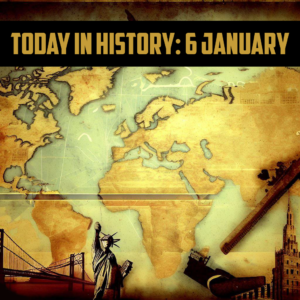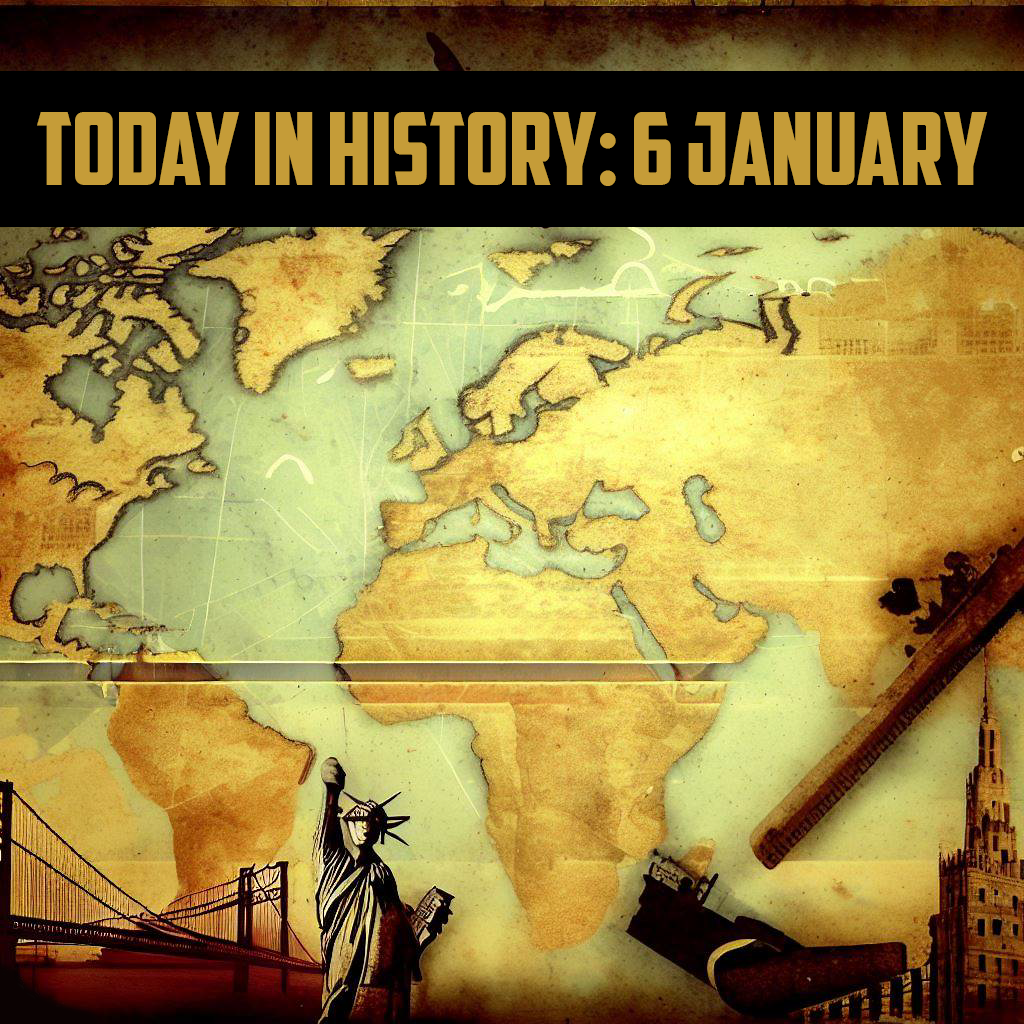The 6th of January has been an eventful date throughout history, witnessing transformative events, influential decisions, and noteworthy individuals who have left their mark on the global stage. Let’s explore some of these significant events and the impact they had on the world.
Today in History: 6 January

1. Epiphany and Twelfth Night (Christian Tradition) The 6th of January is celebrated as the Epiphany in the Christian calendar. It marks the day the Three Wise Men (Magi) visited the baby Jesus, presenting him with gifts of gold, frankincense, and myrrh. Additionally, in Western Christian tradition, this date also commemorates the baptism of Jesus. The eve of Epiphany, known as Twelfth Night, has been a cause for celebration and is often associated with the end of the Christmas season.
2. Coronation of Richard the Lionheart (1193) On January 6, 1193, Richard I of England, commonly known as Richard the Lionheart, was crowned for the second time. While he is celebrated for his valiant efforts during the Third Crusade, Richard’s reign was marked by significant absences from England, frequent military campaigns, and vast expenditure on warfare. His absence played a part in his brother John’s future rule and the signing of the Magna Carta in 1215.
3. The Fisk University Jubilee Singers’ First Tour (1871) In a move to save Fisk University, a historically black university in Tennessee, from financial ruin, the school’s choral group, the Jubilee Singers, began their first national tour on this day in 1871. Through their performances, they not only raised money for the university but also introduced audiences across the U.S. and the world to traditional African American spirituals.
4. Theodore Roosevelt’s Progressive Speech (1919) Just a few days before his passing, former President Theodore Roosevelt gave a speech on January 6, 1919, where he endorsed a progressive platform. Roosevelt, known for his progressive policies during his presidency, used this speech to stress the importance of national service and societal reform.
5. Introduction of the Income Tax Amendment (1913) On January 6, 1913, the United States Congress ratified the 16th Amendment, which allowed the federal government to levy a direct income tax on its citizens. The ratification marked a significant shift in American fiscal policy and was a response to the nation’s growing financial needs.
6. Pan American Flight 214 Crash (1969) In a tragic event on this day in 1969, Pan American Flight 214 crashed after being struck by lightning, resulting in the death of all 81 passengers on board. This event led to significant advancements in aviation safety, specifically regarding the dangers posed by lightning strikes to aircraft.
7. Harold Holt Sworn in as Prime Minister of Australia (1966) On January 6, 1966, Harold Holt was sworn in as the 17th Prime Minister of Australia. His tenure was short-lived as he mysteriously disappeared while swimming in December 1967, leading to extensive search efforts and much speculation.
8. The Siege of the Alamo Begins (1836) January 6th also played a crucial role in the Texan War for Independence. On this day in 1836, the initial stages of the Siege of the Alamo commenced when Mexican forces began preparations to recapture the fort. While the Alamo ultimately fell, the 13-day siege became a rallying point for Texan forces, with “Remember the Alamo!” becoming a battle cry in their fight for independence.
9. First Meeting of the United Nations General Assembly (1946) In the aftermath of World War II, the United Nations was formed to foster international cooperation and prevent future global conflicts. On January 6, 1946, the UN General Assembly convened for its first meeting in London, setting the stage for many consequential decisions that shaped international relations in the post-war era.
10. Gallaudet University’s Deaf President Now Movement (1988) While not precisely on January 6, it’s worth noting that early January 1988 witnessed significant developments in the Deaf President Now movement at Gallaudet University, the world’s only university for the deaf and hard of hearing. Students protested, demanding a deaf president at the helm, reflecting their belief that a deaf individual could lead and best represent their interests. This movement eventually led to the appointment of Dr. I. King Jordan, the university’s first deaf president.
11. Opening of the First Electrically Lit Football Match (1878) On this day in 1878, Bramall Lane in Sheffield, England, became the first football stadium to be lit by electricity during a match. This event marked the beginning of a new era for sports, especially for evening and nighttime events.
12. The Kepler Space Telescope Discoveries (2015) NASA’s Kepler Space Telescope, on January 6, 2015, announced the discovery of eight more planets in the habitable zone of stars. This discovery heightened the prospects of finding extraterrestrial life and understanding our place in the universe.

Conclusion The 6th of January is rich with historical significance, a day where the courses of nations, scientific advancements, and cultural shifts were deeply affected. As with many dates, it’s a blend of achievements, sorrows, and challenges. The events of this day, like others, provide a mirror to our shared human experience, reflecting the struggles, victories, and aspirations of individuals and societies throughout history.
